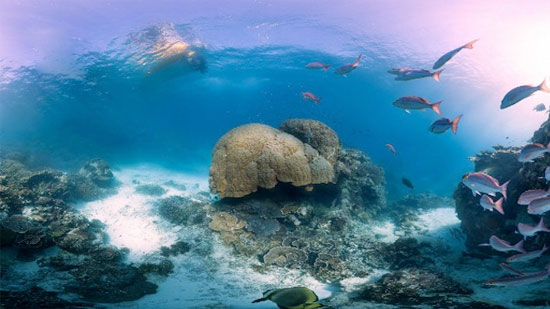Map the global coral
Scientists have published a series of unique photos about the coral world in the 'Caltin Seaview Survey' project (Caltin Sea Vision Survey) with the aim of mapping the world-wide map and studying the great life positive.
The team embarked on the work of mapping Australia's giant Barrier coral reef in September 2012, using a deep-sea diving robot along with high-tech cameras, called SeaView SVII.

Some images of the giant coral reef Barrier are captured by high-tech cameras
Scientists say the high-tech SeaView SVII camera has revolutionized the ocean, automating images with high sharpness that no camera has ever done before.
Under-ocean images taken with 360-degree angles every three seconds, the camera will accurately record the position and orientation of the photo with a GPS device, allowing scientists to accurately assess the health status of Coral reef.
More than 50,000 photos in the expedition 20 coral reefs will be "stitched" together by a special software. From there the image of the coral map will appear on Google Earth.
Hoegh - Guldberg, one of the marine biologists, said: 'We are now halfway through the journey. Meanwhile you will take 100 years to do this with ordinary divers along with normal cameras ".
Observing and studying a number of remote coral reefs in the world will allow scientists to correctly answer the question: when, where and why it is so important. gender is declining.
- The area of global coral is shrinking too fast
- New hope for corals to die from global warming
- Vietnam faces unprecedented storms and floods if the coral reef is lost
- Living Coral - 'Orange coral ngoe nguoi' is the official color of 2019
- Acid in the sea is destroying coral reefs
- Display of 6,000-year rose-shaped fossil corals in Ly Son
- What will happen if the entire coral reef on this Earth disappears?
- Spawning coral: Great product of nature!
- Discover coral reefs that are as bright as a rainbow
- Japanese coral transgender in the seabed
- Coral sperm bank
- The hot climate gradually destroys coral reefs
 Surprised: Fish that live in the dark ocean still see colors
Surprised: Fish that live in the dark ocean still see colors Japan suddenly caught the creature that caused the earthquake in the legend
Japan suddenly caught the creature that caused the earthquake in the legend A series of gray whale carcasses washed ashore on California's coast
A series of gray whale carcasses washed ashore on California's coast Compare the size of shark species in the world
Compare the size of shark species in the world